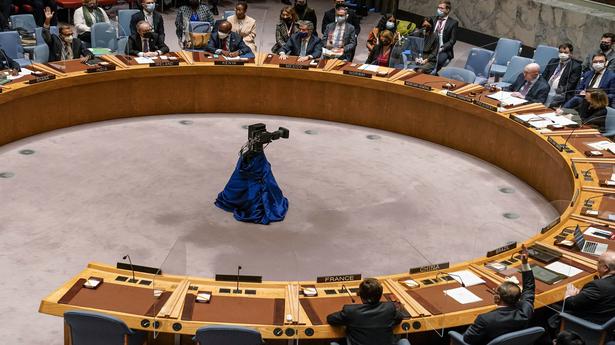
The anatomy of India’s Ukraine dilemma
The Hindu
New Delhi has taken a subtle pro-Moscow position on the question of Russian attacks against Ukraine
New Delhi’s response to the Russian aggression against Ukraine appears to have been shaped by harsh geopolitical circumstances, that it is in the middle of, than its normative beliefs or preferences. Late last week, India abstained from a United Nations Security Council (UNSC) resolution which called for condemning the Russian military action against Ukraine, but it went on to note its uneasiness of the Russian action in writing (a first).
Prime Minister Narendra Modi, who spoke to Russian President Vladimir Putin as the war broke out, called for an “immediate cessation of violence” and has so far refused to pay heed to Ukrainian Ambassador to India Igor Polikha’s impassioned pleas urging Mr. Modi to mediate with Mr. Putin to halt Russian military advances. With the UNSC deadlocked, friends with both the United States/West and Russia, and passionately urged by Ukraine, New Delhi is uniquely placed to undertake some much-needed mediation between the rival sides. But it has chosen to stay on the margins and do no more than the unavoidable minimum. New Delhi just wants this to be over with.
Let us call it what it really is: New Delhi has taken a subtle pro-Moscow position on the question of Russian attacks against Ukraine. This pro-Russia tilt is not just the position of the Indian government, but is something, somewhat surprisingly, shared by much of the Indian strategic community as well. More notably, one is increasingly hearing subtle, though indirect, justifications of the Russian military actions from the doyens of the Indian strategic community. India’s Russia tilt should be seen not just as a product of its time-tested friendship with Moscow but also as a geopolitical necessity.
There are four potential options India can/could choose from: Condemn Russian aggression, support Russian aggression, stay silent on Russian aggression, or express displeasure (short of condemning) and call for diplomacy. The first option will pit India against Russia, the second will pit it against the U.S. and its allies, the third option will be read as pro-Russia, and the fourth option — which it has taken — is the least harmful. And yet, a position that does not condemn Russian aggression and one that abstains from voting on a UNSC resolution calling for “condemning Russian aggression and withdrawal of Russian forces from Ukraine” is indeed a pro-Russia position.
There are understandable reasons for India’s (subtle) pro-Russia position. Let me put it this way: an aggressive Russia is a problem for the U.S. and the West, not for India. North Atlantic Treaty Organization (NATO) expansion is Russia’s problem, not India’s. India’s problem is China, and it needs both the U.S./the West and Russia to deal with the “China problem”. I would view India’s response to the crisis in Ukraine in the light of this rather simple logic.
Let us look at the big picture first. There is today a sobering recognition in New Delhi about the weakening of the U.S.-led global order and the rise of China as a counter-pole, geographically located right next to India. U.S. withdrawal from the region and its decline as the principal system shaper has complicated India’s place in regional geopolitics. Neighbouring China as the rising superpower and Russia as its strategic ally challenging the U.S.-led global order at a time when China has time and again acted on its aggressive intentions vis-à-vis India, and when India is closest to the U.S. than ever before in its history, throws up a unique and unprecedented challenge for India. Therefore, having Russia on its side is crucial for India, more than ever. Moscow may or may not be able to moderate Chinese antagonism towards New Delhi, but an India-Russia strategic partnership may be able to temper New Delhi’s growing isolation in a rather friendless region.
Second, there is an emerging dualism in contemporary Indian strategic Weltanschauung: the predicament of a continental space that is reeling under immense pressure from China, Pakistan and Taliban-led Afghanistan adding to its strategic claustrophobia; and, the emergence of a maritime sphere which presents an opportunity to break out of the same.

‘Instead of accusing Gen-Z of lacking skills or discipline, we need to ask what drives them’ Premium
At a recent event held in the city, Cambridge University Press & Assessment launched an advisory panel comprising leaders from top global corporations, aiming to bridge the employability gap in India and better align academic output with industry needs. A whitepaper released at the event highlighted the growing importance of communication skills, the need for stronger collaboration between industry and universities, and strategies to bridge the persistent skill gap.












